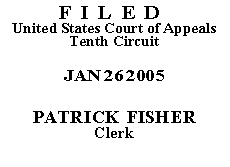

| JAMES COSTELLO, as substitute
party for HARLAN E. BASCOMBE,
deceased,
Plaintiff-Appellant, v. JO ANNE B. BARNHART, Commissioner of Social Security, Defendant-Appellee. |
|
James Costello, as the executor of the estate of Harlan E. Bascombe, appeals the district court's decision that the Commissioner was not required to reopen proceedings on Mr. Bascombe's initial application for Social Security disability benefits. We have jurisdiction under 28 U.S.C. § 1291 and 42 U.S.C. § 405(g), and we affirm.
I.
On July 31, 1989, Mr. Bascombe applied for a period of disability and disability insurance benefits. Although the claim was denied by notice dated September 19, 1989, he did not receive the denial notice. Consequently, he did not appeal the denial to the Appeals Council within the appropriate time period.
In July 1991, having learned of the denial, Mr. Bascombe requested reconsideration of his application. In August 1994, he filed a second application for benefits. In February 1996, the ALJ found that Mr. Bascombe did not have good cause for an untimely request to reopen and refused to reopen the proceedings. The ALJ also determined that Mr. Bascombe's second application was barred by res judicata. The Appeals Council reversed the res judicata determination and remanded. On remand, in July 1997, the ALJ determined that the record supported an inference of mailing of the denial notice, so that the proceedings on the initial application need not be reopened. But the ALJ also determined that, in light of new medical evidence, Mr. Bascombe was entitled to benefits on his second application. The Appeals Council affirmed.
On June 9, 2000, the district court reversed and remanded, holding that the record was insufficient to permit an inference of mailing, and that on remand the ALJ should conduct an evidentiary hearing at which "the Commissioner would have an opportunity to present evidence that would permit a reasonable inference that the denial notice dated September 19, 1989 was actually mailed to the plaintiff." Aplt. App. at 332.
Mr. Bascombe died in October 2000, and Mr. Costello was substituted as the executor of his estate. At an evidentiary hearing held on November 20, 2000, the Commissioner did not present any evidence. In August 2001, however, the ALJ accepted into evidence a letter from Linda Kerr, Program Manager for Kansas Disability Determination Services (the Kansas agency that processes disability claims for the Commissioner), regarding the agency's mailing practices. On November 9, 2001, the ALJ held a supplemental hearing, at which Constance Wold, the director of Kansas Disability Determination Services, testified. In a decision dated April 10, 2002, the ALJ determined that the Commissioner had presented substantial evidence that the denial notice was mailed, and he denied the request to reopen.
The Appeals Council affirmed, and the district court, noting its limited jurisdiction to review the denial of a motion to reopen Social Security disability proceedings, affirmed. Mr. Costello appeals.
II.
Because this case involves a denial of a motion to reopen Social Security proceedings, the federal courts' review is limited. "Absent a colorable constitutional claim, a district court does not have jurisdiction to review the [Commissioner's] discretionary decision not to reopen an earlier adjudication." Blair v. Apfel, 229 F.3d 1294, 1295 (10th Cir. 2000) (quotations and alterations omitted); see also Abbruzzese v. R.R. Ret. Bd., 63 F.3d 972, 974 (10th Cir. 1995) (citing Califano v. Sanders, 430 U.S. 99, 107-08 (1977)). Mr. Costello raises a due process claim, protesting the lack of notice to Mr. Bascombe of the denial of his initial application. See Aplt. Br. at 19.(1) We determine the existence of a constitutional claim as a matter of law, and review the issues of fact underlying the Commissioner's determination for substantial evidence. Wills v. Sec'y, Health & Human Servs., 802 F.2d 870, 873 (6th Cir. 1986).
Due process requires "notice reasonably calculated, under all the circumstances, to apprise interested parties of the pendency of the action and afford them an opportunity to present their objections." Mullane v. Cent. Hanover Bank & Trust Co., 339 U.S. 306, 314 (1950). When the name and address of an interested party is known, due process requires notice by mail or equivalent means designed to tender actual notice. See Mennonite Bd. of Missions v. Adams, 462 U.S. 791, 798-800 (1983). This court has held, however, that "due process does not require that the interested party actually receive the notice."
In re Blinder, Robinson & Co., 124 F.3d 1238, 1243 (10th Cir. 1997); see also United States v. 51 Pieces of Real Prop., 17 F.3d 1306, 1316 (10th Cir. 1994).
Our review of the record indicates that Mr. Costello has raised a colorable constitutional claim, but that the ALJ had substantial evidence to conclude that the agency mailed the denial notice to Mr. Bascombe. In light of our precedent, then, we must conclude that Mr. Bascombe received all the process that he was due. See In re Blinder, Robinson & Co., 124 F.3d at 1243.
The judgment of the district court is AFFIRMED.
Entered for the Court
Circuit Judge
*. This order and judgment is not binding precedent, except under the doctrines of law of the case, res judicata, and collateral estoppel. The court generally disfavors the citation of orders and judgments; nevertheless, an order and judgment may be cited under the terms and conditions of 10th Cir. R. 36.3.
1. Mr. Costello alleges Mr. Bascombe was denied his constitutional rights to notice and to "be present and participate in any hearings involving his claim, including hearings on remand." Aplt. Br. at 19. The latter contention is not explained or further argued on appeal, and thus we deem it waived. See Cudjoe v. Indep. Sch. Dist. No. 12, 297 F.3d 1058, 1069 n.13 (10th Cir. 2002).